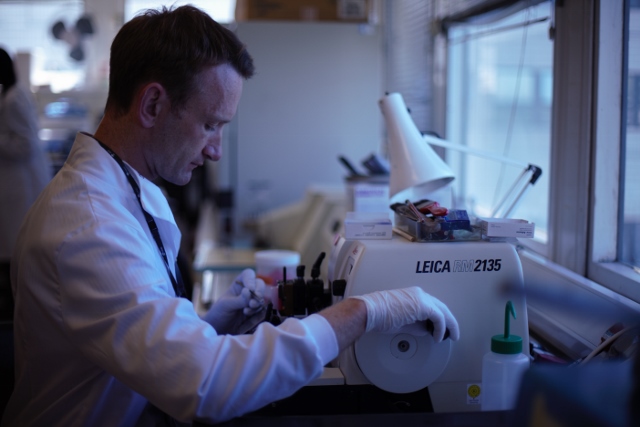The benefit of using cold water to reduce the effect of a burn has been a first aid measure for over two thousand years. Hugh Wright MA BM BCh MRCS is researching the simple but unknown question of why cold reduces the burn effects so that a cream or pill can be produced to imitate the effect. He works at John Radcliffe and Stoke Mandeville.
Animal experiments undertaken by other groups have shown that the temperature within the burn returns to normal within a matter of minutes. Paradoxically, similar studies that show that cold water treatment up to three hours after the burn is still beneficial to healing and scarring. There must be other reasons for the benefit of cooling on burn outcome, and hence other processes within the burn that cause the tissue damage beyond the elevation of temperature alone. Understanding these processes would allow the development of treatments that could improve the outcome of burns in terms of inflammation, burn severity, skin grafting, scarring, long-term disability and even mortality.
We propose to investigate which genes are switched on and off by burning, and by cooling burns. This will identify genes that are beneficial or detrimental to burn outcome. We are doing this by creating burns in human skin that would otherwise be discarded during the course of unrelated surgery. This has the advantage of using living human skin rather than animal skin. Human skin is unique in a number of ways – for example, fewer hairs, more sweat glands and increased scarring problems – to investigate genetic changes in burns. This makes the results immediately transferable to the development of treatments in the future. In this respect, and like many similar Restore experiments, we are pioneering in our focus on non-animal models.
The research is being carried out at Stoke Mandeville Hospital under the supervision of Restore Clinical Director of Research, Mr Michael Tyler, and at the Weatherall Institute of Molecular Medicine at Oxford University under Professor Adrian Harris, and Dominic Furniss, Associate Professor in Plastic Surgery. Specific and entirely novel apparatus has been made by the engineering group at The Department of Oncology in Oxford to facilitate this work. As with Restore’s previous research in this area, it has been vetted under the Regional Ethics system and sponsored by the University of Oxford.
During the first year of this project, recruitment has been 100% and Hugh reports that there has been a supportive response from all the patients enlisted to the study. He has completed his first analysis of the scientific literature in relation to this field and his overview has been accepted into the leading journal Burns. To crown an excellent year for Hugh, against tough opposition he won a coveted Royal College of Surgeons of England Research Fellowship and this will support his endeavours for a full year while he reads for his DPhil degree with Oxford University.
